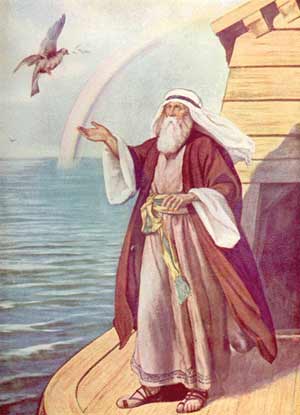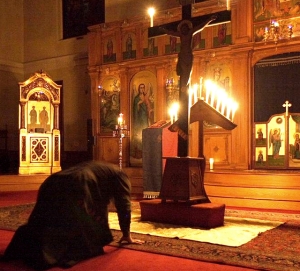
First Sunday of Lent, Year B, Belmont, 2018
According to the book of Genesis, we are all the children of Adam and Eve, the first man and woman. And also, according to Genesis, we are all the children of Noah and his wife (who although nameless in Scripture, was given the name ‘Naamah’ in Jewish tradition). The famous flood had, of course, destroyed the rest of humanity, except for Noah and his three sons, together with their respective wives. Our second reading from the first letter of St Peter, therefore, got its maths right when it reliably informed us about “that ark which saved only a small group of eight people ‘by water’” (1 P 3:20).
St Peter, in his first letter, is also quick to point out the evident parallel between the “water” of the flood and our Baptism: “that water is a type of the baptism which saves you now” (1 P 3:21). In the ‘Blessing of Baptismal Water’ at the Easter Vigil (when there are in fact people to be baptised), the priest prays: “O God who by the outpouring of the flood foreshadowed regeneration, so that from the mystery of one and the same element of water would come an end to vice and a beginning of virtue”. Water drowns and destroys, as well as “saves” and restores.
Christ too was baptised; the story of which you will, of course, find in the Gospels. If you have a look at St Luke’s Gospel, you discover that the account is immediately followed by (no, not the Temptation in the Wilderness, as in St Mark’s Gospel, which we read today, but by) the genealogy of Jesus (his family tree, in other words). Christ, like us, was a descendant of both Adam and Noah and, in his case, via Noah’s son, Shem. The genealogy in the Gospel of Luke is as such sandwiched between the story of the Baptism and that of the Temptation.
Christ shared in our humanity, as well as the divinity; and just as the genealogy concludes by stating that he is the “son of Adam, son of God” (Lk 3:38), so in the Baptism (which all sinful sons of Adam are surely in need of, though Christ himself was without sin) we hear the divine voice proclaiming: “You are my Son” (Lk 3:22). There is indeed a universal call to salvation; and therefore a universal call to Baptism, for us to be saved from sin and share in Christ’s divine sonship. If we return to St Mark’s Gospel and turn to the very end instead of the beginning, we read of Christ’s parting commission to his disciples: “Go out to the whole world; proclaim the Good News to all creation. He who believes and is baptised will be saved” (Mk 16:15-16a). We have already mentioned that “only a small group of eight people” (1 P 3:20) were saved by the great flood. And yet in that “small group” was in effect prefigured “the whole world”, since the three sons of Noah represented the three known continents: Shem Asia; Ham Africa; and Japheth Europe.
The parallel between the story of the flood in Genesis and of Jesus in the Gospel continues in regard to another reference to a number: “The Spirit [at his Baptism, who descended as it happened “like a dove” (Mk 1:10), thus recalling the dove sent by Noah over the flood (cf. Gn 8:8)] drove him out into the wilderness and he remained there for forty days, and was tempted by Satan” (Mk 1:12-13a); “The flood lasted forty days on earth” (Gn 7:17a). Although it seems that neither Noah nor any of the others in the ark were similarly tempted, they were, like our Lord in the wilderness, “with the wild beasts” (Mk 1:13b): that ark crammed full with every kind of bird and animal.
Just as we can draw a soteriological conclusion from this comparison between the flood and Christ’s Baptism and subsequent Temptation (‘soteriological’ by the way signifying matters related to salvation); so we, perhaps rather unsurprisingly, can do the same as regards ecological matters. In the minds of many, however, the saving of the planet has more resonance than the saving of souls, yet both are symbolised by Noah’s ark, “which saved only a small group of eight people ‘by water’” (1 P 3:20), as well as saving, or rather conserving, every species of animal from extinction. Similarly, our Lord offers us salvation through the waters of his Baptism, while also seeming to show his concern, and clearly not disdain, for wildlife by his being “with the wild beasts” (Mk 1:13b).
see "The Cross and the Cosmos" below.
see "The Cross and the Cosmos" below.
As we now prepare for Easter and the renewing of our own Baptismal promises, let us resolve, like God himself (through the waters of the flood, which prefigure those of our Baptism), to put “an end to vice” (Blessing of Baptismal Water), to the wickedness on earth (cf. Gn 6:5). And also like him, to make that promise (which we heard right at the end of today’s first reading): “never again […] to destroy all things of flesh” (Gn 9:15). We have reached a stage in our history when our destruction of the planet has become, to some degree, critical (Pope Francis specifically drawing our attention and conscience to this in recent years). It stands to reason that this destruction is in no sense constructive; as it is our faith that planet earth is part of God’s creation (a small, though obviously very important, part in the scale of things).
Like our Lord, we have to wrestle with temptation, with Satan and the wickedness of sin in the wilderness which is life on earth; yet, at the same time, we want to live harmoniously “with the wild beasts” (Mk 1:13b) who also inhabit this wilderness. This time of Lent is marked by that call to repentance: “Repent, and believe the Good News” (Mk 1:15b), the concluding words of today’s Gospel, which we might also have heard being pronounced while we were being daubed with ashes last Wednesday. Let us “repent” then of what we have done or indeed failed to do, firstly, to our neighbours and, secondly, to our planet; yet let us “believe the Good News” of our salvation and of our being not simply the children of either Adam or Noah but rather of our being adopted children of “Our Father, who art in heaven” (Mt 6:9).
see: The Cross and the Cosmos

It seems worthwhile to continue with thoughts on the instrument of our salvation. In a short work, The Beginning of the Day, (I believe it was a special printing and is not generally available), Met. Kallistos Ware notes this about the Cross and its connection with the whole of creation:
…[The] created order in its entirety participated in the Savior’s Passion: the earth shook, the rocks were split, the whole cosmos shuddered (Matt. 27:51). In the words of St. Ephrem the Syrian, ‘humans were silent, so the stones cried out’. As the old English poem The Dream of the Rood expresses it, ‘All creation wept.’ This all embracing participation in the death of God incarnate is memorably expressed in the Praises or Enkomia sung in the evening of Good Friday or early in the morning on Holy Saturday:
‘Come, and with the whole creation let us offer a funeral hymn to the Creator.’
‘The whole earth quaked with fear, O lord, and the Daystar hid its rays, when Thy great light was hidden in the earth.’
‘The sun and moon grew dark together, O Savior, like faithful servants clothed in black robes of mourning.’
‘O hills and valleys’, exclaims the Holy Virgin, ‘the multitude of mankind and all creation, weep and lament with me, the Mother of God.’
Most remarkably of all in what is truly an amazing statement, it is affirmed: ‘the whole creation was altered by Thy Passion: for all things suffered with Thee, knowing, O Lord, that Thou holdest all in unity.’
Do we reflect sufficiently, I wonder, upon the environmental impliations of our Lord’s Incarnation, upon the way in which Jesus is ecologically inclusive, embedded in the soil like us, containing within His humanity what has been termed ‘the whole evolving earth story’?
Do we allow properly for the fact that our Savior came to redeem, not only the human race, but the fullness of creation? Do we keep constantly in mind that we are not saved from but with the world?
In such a fashion St. Paul can say that the “world is crucified to me, and I to the world.” Frequently our own thoughts about the things of God are too restricted, too limited. The Cross is diminished to an execution role in a very narrow atonement theory, the Incarnation reduced to a stage entrance. These great mysteries of God, manifest among us, are the gate and ladder, the entrance into the Kingdom of God and Kingdom of God’s entrance into our world. This is true not only of the Cross of Golgotha, but ultimately in every Cross that participates in its reality. A believer’s making of the sign of the cross, with faith, participates in this reality (and so the demons flee).
Christ has promised that we would have life “more abundant.” By this is not meant that we will be rich or have more material things (for these are not the true life). But the Kingdom is an endless abundance that enters our heart and world, shattering the narrowness of opaque minds and opening to us the fullness of life in Christ.
The Reality presented to us in the Cross (as with all things of God) is never comprehended in rational theory. It pushes us beyond the limits of our own poorly defined rationality and towards the greater rationality of the Truth of things. As noted by St. Gregory of Nyssa, “only wonder grasps anything.” To approach the Cross with wonder is to begin the journey that it makes possible. The life that we refer to as salvation belongs to this world of wonder – despite the banalities of much Christian conversation on the topic.
It is not surprising that silence is among the most important tools in our spiritual life. O, sweet wonder!

All creatures of our God and King
Lift up your voice and with us sing,
Alleluia! Alleluia!
Thou burning sun with golden beam,
Thou silver moon with softer gleam!
Refrain: O praise Him! O praise Him!
Alleluia! Alleluia! Alleluia!
Thou rushing wind that art so strong
Ye clouds that sail in Heaven along,
O praise Him! Alleluia!
Thou rising moon, in praise rejoice,
Ye lights of evening, find a voice!
Refrain
Thou flowing water, pure and clear,
Make music for thy Lord to hear,
O praise Him! Alleluia!
Thou fire so masterful and bright,
That givest man both warmth and light.
Refrain
Dear mother earth, who day by day
Unfoldest blessings on our way,
O praise Him! Alleluia!
The flowers and fruits that in thee grow,
Let them His glory also show.
Refrain
And all ye men of tender heart,
Forgiving others, take your part,
O sing ye! Alleluia!
Ye who long pain and sorrow bear,
Praise God and on Him cast your care!
Refrain
And thou most kind and gentle Death,
Waiting to hush our latest breath,
O praise Him! Alleluia!
Thou leadest home the child of God,
And Christ our Lord the way hath trod.
Refrain
Let all things their Creator bless,
And worship Him in humbleness,
O praise Him! Alleluia!
Praise, praise the Father, praise the Son,
And praise the Spirit, Three in One!
THE CROSS AND THE COSMOS
by Father Stephen Freeman (Orthodox)see: The Cross and the Cosmos

It seems worthwhile to continue with thoughts on the instrument of our salvation. In a short work, The Beginning of the Day, (I believe it was a special printing and is not generally available), Met. Kallistos Ware notes this about the Cross and its connection with the whole of creation:
…[The] created order in its entirety participated in the Savior’s Passion: the earth shook, the rocks were split, the whole cosmos shuddered (Matt. 27:51). In the words of St. Ephrem the Syrian, ‘humans were silent, so the stones cried out’. As the old English poem The Dream of the Rood expresses it, ‘All creation wept.’ This all embracing participation in the death of God incarnate is memorably expressed in the Praises or Enkomia sung in the evening of Good Friday or early in the morning on Holy Saturday:
‘Come, and with the whole creation let us offer a funeral hymn to the Creator.’
‘The whole earth quaked with fear, O lord, and the Daystar hid its rays, when Thy great light was hidden in the earth.’
‘The sun and moon grew dark together, O Savior, like faithful servants clothed in black robes of mourning.’
‘O hills and valleys’, exclaims the Holy Virgin, ‘the multitude of mankind and all creation, weep and lament with me, the Mother of God.’
Most remarkably of all in what is truly an amazing statement, it is affirmed: ‘the whole creation was altered by Thy Passion: for all things suffered with Thee, knowing, O Lord, that Thou holdest all in unity.’
Do we reflect sufficiently, I wonder, upon the environmental impliations of our Lord’s Incarnation, upon the way in which Jesus is ecologically inclusive, embedded in the soil like us, containing within His humanity what has been termed ‘the whole evolving earth story’?
Do we allow properly for the fact that our Savior came to redeem, not only the human race, but the fullness of creation? Do we keep constantly in mind that we are not saved from but with the world?
In such a fashion St. Paul can say that the “world is crucified to me, and I to the world.” Frequently our own thoughts about the things of God are too restricted, too limited. The Cross is diminished to an execution role in a very narrow atonement theory, the Incarnation reduced to a stage entrance. These great mysteries of God, manifest among us, are the gate and ladder, the entrance into the Kingdom of God and Kingdom of God’s entrance into our world. This is true not only of the Cross of Golgotha, but ultimately in every Cross that participates in its reality. A believer’s making of the sign of the cross, with faith, participates in this reality (and so the demons flee).
Christ has promised that we would have life “more abundant.” By this is not meant that we will be rich or have more material things (for these are not the true life). But the Kingdom is an endless abundance that enters our heart and world, shattering the narrowness of opaque minds and opening to us the fullness of life in Christ.
The Reality presented to us in the Cross (as with all things of God) is never comprehended in rational theory. It pushes us beyond the limits of our own poorly defined rationality and towards the greater rationality of the Truth of things. As noted by St. Gregory of Nyssa, “only wonder grasps anything.” To approach the Cross with wonder is to begin the journey that it makes possible. The life that we refer to as salvation belongs to this world of wonder – despite the banalities of much Christian conversation on the topic.
It is not surprising that silence is among the most important tools in our spiritual life. O, sweet wonder!
THE CANTICLE OF THE SUN
by St Francis of Assisi

Verses from St. Francis of Assisi’s Canticle of the Sun were translated as a children’s hymn by the English hymn writer William H. Draper (1855—1933).Canticle of the Sun - St. Francis' poem immortalized in songUsually sung to the melody composed by Peter von Brachel of Cologne, Germany, in 1623 with the harmony provided by the English composer Ralph Vaughan Williams in 1906:
All creatures of our God and King
Lift up your voice and with us sing,
Alleluia! Alleluia!
Thou burning sun with golden beam,
Thou silver moon with softer gleam!
Refrain: O praise Him! O praise Him!
Alleluia! Alleluia! Alleluia!
Thou rushing wind that art so strong
Ye clouds that sail in Heaven along,
O praise Him! Alleluia!
Thou rising moon, in praise rejoice,
Ye lights of evening, find a voice!
Refrain
Thou flowing water, pure and clear,
Make music for thy Lord to hear,
O praise Him! Alleluia!
Thou fire so masterful and bright,
That givest man both warmth and light.
Refrain
Dear mother earth, who day by day
Unfoldest blessings on our way,
O praise Him! Alleluia!
The flowers and fruits that in thee grow,
Let them His glory also show.
Refrain
And all ye men of tender heart,
Forgiving others, take your part,
O sing ye! Alleluia!
Ye who long pain and sorrow bear,
Praise God and on Him cast your care!
Refrain
And thou most kind and gentle Death,
Waiting to hush our latest breath,
O praise Him! Alleluia!
Thou leadest home the child of God,
And Christ our Lord the way hath trod.
Refrain
Let all things their Creator bless,
And worship Him in humbleness,
O praise Him! Alleluia!
Praise, praise the Father, praise the Son,
And praise the Spirit, Three in One!
Refrain
Canticle of the Sun
St Francis of Assisi, the Reluctant Saint









No comments:
Post a Comment